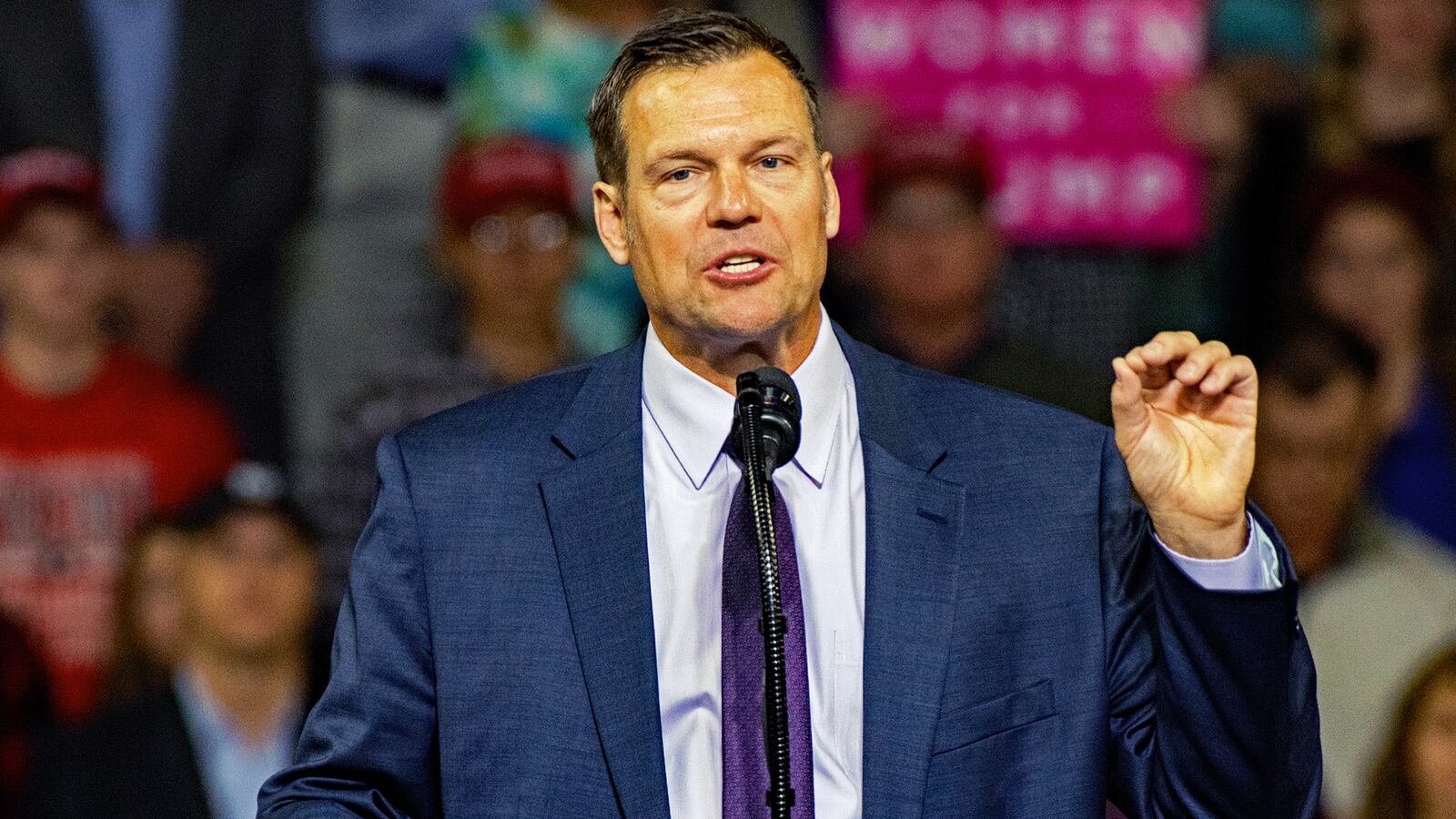Former Kansas Secretary of State Kris Kobach is being accused of illegally using a nonprofit group he advises to raise money for his 2020 Senate run. Faced with the accusations, Kobach’s campaign can’t seem to get its story straight.
The Daily Beast reported on Thursday that Kobach had sent a fundraising plea to the email list owned by We Build The Wall—a nonprofit group looking to privately finance wall construction on the southern U.S. border—asking subscribers to donate to his Republican Senate primary campaign. Kobach is We Build The Wall’s general counsel.
Legal experts said the email appeared to violate laws barring corporations from contributing to political campaigns and requiring campaigns to include “paid for by” disclaimers on their official communications.
In an emailed statement late Thursday night, the Kobach campaign’s field director, Kerrick Kuder, denied any knowledge of the email. “That email did not come from the Kobach campaign or any association there of,” he wrote.
But the following day, the campaign released a statement implying that the email was in fact the work of a Kobach campaign vendor. “If any mistake was made with respect to the vendor's failure to include a ‘Paid for by’ notice on any campaign email, that was immediately addressed by the sending of a correction email to all recipients of the original email,” the statement said.
As of Sunday afternoon, no such email had gone out to subscribers of the We Build The Wall list that Kobach used to solicit campaign contributions and the Kobach campaign had not provided a copy of the email they claimed was sent to The Daily Beast.
“I see no way to reconcile the statement that the ‘email did not come from the Kobach campaign or any association there of’ and the reference to whoever sent the email as a ‘vendor,’ presumably a vendor of the Kobach campaign,” said Paul S. Ryan, vice president of policy and litigation at the group Common Cause.
Ryan’s group filed complaints with the Federal Election Commission and the Department of Justice alleging “reason to believe that solicitations for campaign contributions to [Kobach’s] Senate campaign distributed by We Build the Wall, Inc. violated multiple campaign finance laws [and] the ban on corporate contributions to a federal candidate.”
The second Kobach campaign statements devoted three of its four paragraphs to attacking Common Cause, dubbing it “a radical leftist organization that routinely files FEC complaints against conservative Republican candidates’ campaigns.” The campaign called the complaints “frivolous.”
But the campaign’s inconsistent statements make it difficult to know whether the campaign did, in fact, sign off on the fundraising email, and whether it compensated We Build The Wall at fair market value for doing so.
Those are crucial questions for the legal allegations against the Kobach campaign. If the campaign did pay the nonprofit for use of the email list, the campaign likely violated a federal law requiring that official campaign communications disclose which entities paid for them. If the campaign did not make that payment, the email may have constituted an illegal in-kind contribution to the Kobach campaign.
The Kobach campaign did not respond to inquiries attempting to clarify those matters. We Build The Wall also did not respond to questions.
According to Brendan Fischer, the director of federal and FEC reforms at the Campaign Legal Center, the Kobach campaign’s statement doesn’t just obfuscate the factual issues at play, it significantly downplays the seriousness of the allegations against it.
“It isn’t just that a disclaimer is missing,” Fischer wrote in an email. “Both the content of the message and the We Build the Wall logo at the top indicate that this is a message from the nonprofit, rather than an instance where the campaign rented the nonprofit’s list.”
Kobach only declared his Senate candidacy last month, and will not have to file a financial disclosure report until October, making it difficult to independently determine whether it disbursed any money in connection with the We Build The Wall email. Both Fischer and Ryan said they would be watching closely for any clues in the campaign’s first FEC report. Fischer said it also might reveal other similarly problematic activities.
“This raises questions about whether Kobach is illegally using nonprofit resources to support his campaign in other ways,” he said. “If Kobach was sloppy enough to use his nonprofit for a widely-distributed campaign fundraising email, what else is going on behind the scenes?”





